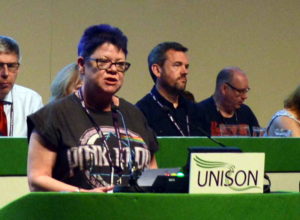
Following last year’s conference decision to vote down a comprehensive 25 year review of our union, delegates overwhelmingly backed a more limited lay-led review of activity and expenditure at all levels of the union.
Conference also supported an interim amended funding scheme to begin in January 2020, which should leave no branch worse off but will end the need for branches to make a case under the Activity Based Budget system for additional funding.
An amendment from the National Disabled Members Committee calling for the self-organised groups to be represented on the review group was defeated.
Davena Rankin, Scotland NEC member spoke against the amendment and told delegates that equalities, proportionality and fair representation are at the heart of everything we do.
“These are not just words we pay lip service to, as they are written into our rule book and govern everything we do from the composition of NEC working groups to our elections,” said Davena.
She reminded that the NEC includes two members elected to disabled members’ seats, four members elected to Black members’ seats and two young members’ seats.
“These elected NEC reps play an important role as they also sit on their national self-organised committee or forum,” she said, reminding that there are also NEC members who are active in the Black, disabled members, LGBT and women SOGs.
She pledged to ensure that the twelve NEC members who sit on the review group truly represent the diversity of our union and that the NEC will continue to consult with the national SOG committees and young members forum.
“As the former chair of the national women’s committee, a former member of the national Black members committee as well as being active at a regional and branch level in equalities, I am convinced that the proposed structure of the review group will ensure that the SOGs and young members forum have their voices fully heard, both through their NEC reps and their regional reps” said Davena.
A further amendment from North West, was carried, ensuring that throughout the review period Regions will still be able to use the Regional pool to fund organising initiatives in branches.

Supporting, Scotland’s Elaine Duffy highlighted the benefits of the Regional pool, saying, “In Scotland we believe it is vitally important to ensure Regional Pool funding is retained to safeguard many of the organising initiatives in branches.
“We have used Regional Pool funding to fund consultative ballots on pay in local government and in further education.”
She gave other examples including branch internet cafes for low paid members with no internet access; women’s professional coaching and mentoring training; sending two delegates to the international May Day brigade in Cuba; recruitment and retention around the Organising for Growth campaign in the community and voluntary sector; training events for young members; and reissued guides on dealing with asylum seekers and refugees.
“It was also used to support Pride events which have grown from three to nine to seventeen, stretching right across the country. This year’s expected reach is 120,000 people, a large proportion of whom are public sector employees.”
She pointed out that the media and social media coverage and advertising that has resulted is invaluable.
“In Scotland this year we have been shared on social media by national press, LKGBT press, local MPs and MSPs and the Scottish Government’s equality team. You can’t buy coverage like that,” said Elaine.
“For a small investment from the Regional Pool we achieve thousands of pounds of free promotion for UNISON and our agenda.”
